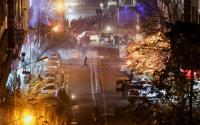Common Dreams / Published on Saturday, October 2, 2004 by the International Herald Tribune
Nuclear weapons and experiments have been the subject of most recent news from Korea on security issues. But the promise (or threat) of U.S. troop withdrawals has probably made the bigger impact on the South Koreans.
This is another step in a larger phenomenon that might be described as Asia's return to history. Asia was very much a part of history during World War II, when Japan, in a few months, single-handedly drove the United States, Britain, France and the Netherlands out of East and Southeast Asia and the western Pacific.
Japan was acting on history to remake Asia. China was at the same time, and for years after, a victim of its own titanic and disastrous effort to remake itself. This had terrific consequences inside China; but outside, the Maoist victory, the Great Leap Forward and the Cultural Revolution influenced only the leftist imagination and the right's cold war fears.
Vietnam made its share of history, not because Vietnam itself was important, but because of Washington and the American policy community's paranoia about what it could produce: some huge anti-American upsurge of all the Third World. (That had to await 2003 and George W. Bush's invasion of Iraq.)In fact, Vietnam's was only a nationalist insurrection like many others, but a very successful one - as nationalist insurrections tend generally to be.
From Japan's surrender to the present day, East Asia may be said to have been absent from history, whatever Washington's apprehensions about China becoming the new Superpower. World War II, the Korean War and Vietnam left American forces deployed along the periphery of the Asian landmass, from the Korean to the South China seas, and there they have stayed.
They were welcome in South Korea because of the presumed threat - and more to the point, the seeming irrationality - of North Korea. Elsewhere they were at first thought necessary by Washington to defend Taiwan from Communist China. But Richard Nixon decided that Taiwan was Chinese - although the Chinese could not be permitted to take it. Ultimately, the reason U.S. forces remained in Asia was inertia. They were and are there because they are there; and the people who decide such things, in the ancient and prudent traditions of bureaucracy, have been unwilling to do anything to undermine a generally stable situation. It is not a situation that can be expected to last indefinitely. South Korea, psychologically, remains an occupied country. There is much popular resentment of the American troops stationed in South Korea. There is also great fear of what might happen if they left.
However, events elsewhere have intruded upon the existing stability. The United States is very badly in need of troops for Iraq. It already is conducting backdoor conscription for Iraq of present and former reservists and National Guard soldiers.
Once the presidential election is over, and administration illusions that Iraq elections in January (if they take place) will somehow solve the Iraq problem vanish, the military manpower emergency will be inescapable. Even after being reduced by a third from its present level, how long can the United States have a force of 25,000 troops immobilized in South Korea? The force already is being redeployed south from Seoul, to where it no longer is an automatic deterrent to North Korean invasion.
Okinawa is a convenient base for a Marine Expeditionary Force of roughly the same size; and the troops there, as in South Korea, can be rotated to Iraq; but the Marines' presence is increasingly unpopular.
Chinese, Japanese and South Korean financing of the American fiscal deficit emphasizes the change that has taken place in Washington's relationship with the major states of the region, underlying mounting American vulnerabilities, and American dependence on the Asians. American military power, seemingly very great, is proving largely irrelevant to the real issues of the so-called war on terror. This, too, is undermining the American position in Asia (as it is in Europe). Thanks to Al Qaeda, Muslim Asia re-entered history in a big way in September 2001, to American dismay. The effects are now being felt in East Asia, and this is only the beginning.
The half-century-old structure of stability in East Asia is weakening. This would be dangerous in any case, but it is particularly dangerous today because neither the South Korean nor the Japanese governments seems prepared for the demands that America's crisis is about to make on them. Their re-engagement with history - 21st century history - could prove a rough one.






